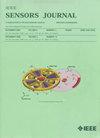Personality Assessment From Gait With Wearable IoT Sensors and Multiscale CNN
IF 4.3
2区 综合性期刊
Q1 ENGINEERING, ELECTRICAL & ELECTRONIC
引用次数: 0
Abstract
Personality reflects an individual’s enduring patterns of thought and behavior, while gait—a measurable and consistent behavioral trait—offers a unique and objective way to assess personality through natural, nonvolitional movement. Unlike traditional methods, such as self-report questionnaires, which are often subject to biases and limited accuracy, gait-based assessment provides a more direct and spontaneous measure of personality. This study introduces a gait-based personality assessment system that leverages a low-cost wearable Internet of Things (IoT) sensor to capture fine-grained motion data, including triaxial acceleration and angular velocity from the wrist and the ankle. By focusing on the natural, involuntary aspects of gait, the system avoids the biases inherent in self-presentation. Additionally, the study presents the “Gait–Personality” dataset, featuring advanced gait phase segmentation and optimized feature extraction techniques to enhance data quality. To tackle challenges like variability in stride length and cadence, a multiscale 1-D convolutional neural network (MS-1D-CNN) was developed. By utilizing convolutional layers with multiple kernel sizes, the model captures both detailed and high-level temporal features, effectively adapting to diverse gait patterns while remaining robust to sensor variability. Experimental results demonstrate classification accuracies ranging from 77% to 84.5% across the Big Five personality dimensions, validating the system’s ability to objectively capture authentic personality traits. This study establishes a reliable, cost-efficient, and scalable framework for personality assessment, offering broad implications for psychological evaluation, mental health monitoring, and human–computer interaction, with the potential for widespread real-world applications.基于可穿戴物联网传感器和多尺度CNN的步态人格评估
性格反映了一个人持久的思想和行为模式,而步态——一种可测量的、一致的行为特征——提供了一种独特而客观的方式,通过自然的、非意志的运动来评估个性。不像传统的方法,如自我报告问卷,往往受到偏见和有限的准确性,基于步态的评估提供了一个更直接和自发的个性测量。本研究介绍了一种基于步态的人格评估系统,该系统利用低成本的可穿戴物联网(IoT)传感器来捕获细粒度的运动数据,包括手腕和脚踝的三轴加速度和角速度。通过关注步态的自然、非自愿方面,该系统避免了自我表现固有的偏见。此外,该研究还提出了“步态-个性”数据集,采用先进的步态相位分割和优化的特征提取技术来提高数据质量。为了解决步幅和节奏变化等挑战,开发了多尺度一维卷积神经网络(MS-1D-CNN)。通过使用具有多个核大小的卷积层,该模型捕获了详细和高级的时间特征,有效地适应了不同的步态模式,同时保持了对传感器可变性的鲁棒性。实验结果表明,五大人格维度的分类准确率在77%到84.5%之间,验证了该系统客观捕捉真实人格特征的能力。本研究建立了一个可靠、经济、可扩展的人格评估框架,为心理评估、心理健康监测和人机交互提供了广泛的意义,具有广泛的现实应用潜力。
本文章由计算机程序翻译,如有差异,请以英文原文为准。
求助全文
约1分钟内获得全文
求助全文
来源期刊

IEEE Sensors Journal
工程技术-工程:电子与电气
CiteScore
7.70
自引率
14.00%
发文量
2058
审稿时长
5.2 months
期刊介绍:
The fields of interest of the IEEE Sensors Journal are the theory, design , fabrication, manufacturing and applications of devices for sensing and transducing physical, chemical and biological phenomena, with emphasis on the electronics and physics aspect of sensors and integrated sensors-actuators. IEEE Sensors Journal deals with the following:
-Sensor Phenomenology, Modelling, and Evaluation
-Sensor Materials, Processing, and Fabrication
-Chemical and Gas Sensors
-Microfluidics and Biosensors
-Optical Sensors
-Physical Sensors: Temperature, Mechanical, Magnetic, and others
-Acoustic and Ultrasonic Sensors
-Sensor Packaging
-Sensor Networks
-Sensor Applications
-Sensor Systems: Signals, Processing, and Interfaces
-Actuators and Sensor Power Systems
-Sensor Signal Processing for high precision and stability (amplification, filtering, linearization, modulation/demodulation) and under harsh conditions (EMC, radiation, humidity, temperature); energy consumption/harvesting
-Sensor Data Processing (soft computing with sensor data, e.g., pattern recognition, machine learning, evolutionary computation; sensor data fusion, processing of wave e.g., electromagnetic and acoustic; and non-wave, e.g., chemical, gravity, particle, thermal, radiative and non-radiative sensor data, detection, estimation and classification based on sensor data)
-Sensors in Industrial Practice
 求助内容:
求助内容: 应助结果提醒方式:
应助结果提醒方式:


